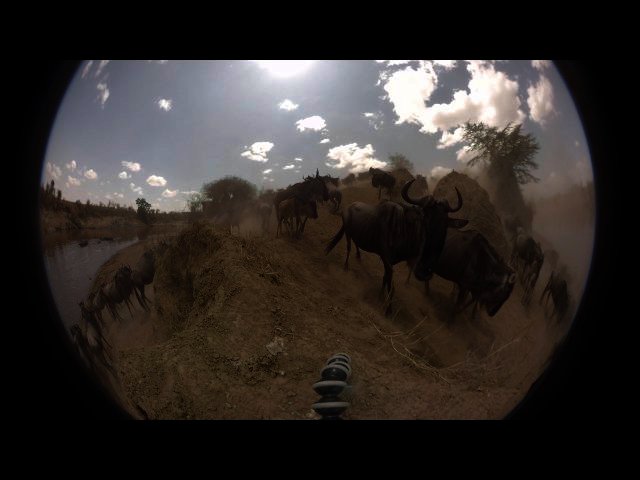Business News sponsored by:
How did a South African production company manage to film the world’s first narrated virtual reality (VR) wildlife documentary? With many unpredictable close encounters, stubborn hooved-migrators, a never-say-die attitude and some incredible last-minute footage.
Exodus: The Great Migration takes viewers on an immersive 360 degree virtual journey through one of the greatest natural phenomena on Earth - the annual great wildebeest migration in the Maasai Mara, Kenya. Viewers can experience a sense of physical presence on location, while being confronted by charging herds of wildebeest and their natural predators. The team behind this international first is Parkhurst-based Deep VR, which has risen over the past 3+ years to become Africa’s most experienced cinematic VR production company.
The documentary’s local debut took place at the Circa art gallery in Rosebank, Johannesburg, and entailed a pop-up cinema with specialised VR goggles, vibrating floor, and scents of the African bush for an out-of-this-world viewing experience.
An idea sparked by a craving for extreme creativity
The idea for Exodus stemmed from the Deep VR team’s hunger to create truly original African content. Company CEO Ulrico Grech-Cumbo notes, “We decided that we couldn’t just wait for the future to happen, we have to become co-creators of it. We asked ourselves, how can we use this technology to foster appreciation, education and conservation for Mother Nature in a way no technology has ever allowed before? In a crazed leap of faith, we set out on the ultimate creative challenge for our first original piece: film the greatest mammal migration on the plains of the Maasai Mara, in VR.”
“Having to self-fund this passion project was a humbling experience. We went to the US to pitch Exodus to a well-known wildlife broadcaster, but got turned down. We experimented with a crowdfunding campaign and managed to raise enough capital for a few plane tickets to Kenya. That was just enough for us to decide, to heck with it, let’s commit,” says Grech-Cumbo.
A journey out of this world
As a company specialising in 360 video, a great deal of attention was paid to the filming equipment needed for the shoot. One of the biggest challenges when filming wildlife in 360 is that it can’t be filmed from the back of a game truck with a zoom lens like crews filming traditional documentaries. The VR cameras had to be rigged and placed as close to the action as possible. “At the time there was nothing you could buy in a store to film a project like this, so we developed camera systems in-house, ensuring the rig was trample-proof and camouflaged,” says Grech-Cumbo. Even with all the preparations, the team were kept on their toes throughout the trip, with a specially ordered drone malfunctioning twice, camera-shy wildebeest refusing to cross the river as soon as they spotted the camera rigs, and innumerable equipment malfunctions.
It was trials like these that resulted in a nerve-wracking ten days in the Maasai Mara. Equipment and finicky animals were far from the team’s only worries. Deep VR’s local guide abandoned them soon after they landed, the team picked up dysentery which confined them to their beds, and one of the crew was almost gored by a wildebeest. Amending the filming permits for the park was also an issue, as the Deep VR team actually had to leave their vehicles and traipse on foot throughout the National Reserve to set up the rigs – an unprecedented way of filming in the park.
Light at the very end of the tunnel
Wild animals don’t always play along, and the wildebeests were no exception. After seven days of shooting, the Deep VR crew virtually had no footage. “That was terrifying, thinking we had invested so much time and money and now would have to return and tell people our mission had failed,” Grech-Cumbo mentions.
Then, on the very last day, Mother Nature showed mercy and everything fell into place. With all cameras rolling, thousands of wildebeest rushed headlong down the riverbank and crashed into the water for the epic crossing. “You could see the relief on everyone’s faces, we were all ecstatic,” Grech-Cumbo laughs.
International ambitions
Exodus: The Great Migration has received international praise and is part of the official selection for a number of film festivals, including The Wildscreen Festival, the Austin Indie Fest, the Melbourne Fringe and the VR Arles Festival, while also screening at the Samsung™ Developer Conference 2017 as a curated piece.
As for the future of Deep VR’s 360 wildlife documentary ambitions, Grech-Cumbo revealed that the success of Exodus: The Great Migration has allowed Deep VR to establish a wildlife division focused on telling original, self-funded stories about natural history, wildlife and the environment.
The new wildlife division’s first project, Exodus: The Great Migration, will form part of a broader VR series that focuses on mass migrations of mammals, birds, invertebrates and insects across the globe. Upcoming immersive VR episodes will feature, amongst others, the Amur falcon’s incredible 60 000 km journey from Mongolia to South Africa in Exodus: Amur Falcons.
Exodus: The Great Migration is co-directed by Ulrico Grech-Cumbo and Telmo dos Reis, with public screenings of the documentary happening at the Circa art gallery for two days following the premiere. The screening will also include “Made in the Mara”, a unique short film directed by Amy Montalvo, who followed the VR crew to document the creation of the VR piece and all its struggles.
Both the VR documentary and the short film can be viewed online at www.deepvr.co.za/exodus. where information about public screenings can also be found.






